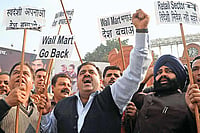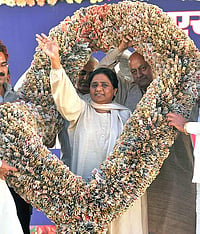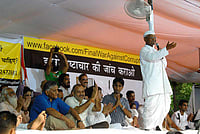The acquittal of all the accused in Jessica Lal’s case has been a wake upcall for the media and the elite in the country about the state of the judicialsystem in India. While the collapse of the judicial system in India was widelyperceived by the weaker sections of society, for most of whom the system neverexisted, it took the abject failure of a case like Jessica Lal’s (where thevictim was a member of the elite) to bring home this reality to the dominantclasses.
Jessica Lal’s case has only underscored the grim reality that virtually noinfluential person accused of any crime gets punished through the Criminaljustice system. Whether it is Chandraswamy, or Narasimha Rao or the Hindujasaccused of white collar crime, or whether it is a Manu Sharma, or a Nanda or aSoren accused ot violent crimes, all of them roam freely in the country; theirtrials continuing for decades, before the end of which they die or at the end ofwhich they are acquitted. Of course, occasionally a petty constable may getquickly convicted, but that is because, he is not so influential and withoutpowerful godfathers.
The reasons for this failure of justice are obvious to anyone who understandsthe system. To begin with, an influential accused is usually able to influenceand compromise the investigating agency, the state of the police in this countrybeing what it is. Thus he is usually not even charged for the crime andsometimes completely innocent poor persons come to be charged with their crime.In the unlikely event that an influential accused comes to be charged, it iseasy for him to employ expensive lawyers, to prolong a trial for years and evendecades. The average length of a trial in this country exceeds 5 years and wouldexceed a decade in some parts of the country. While poor people without accessto lawyers continue to languish in jail during trial, the influential ones cancontinue with their normal lives and crimes on bail, during their trials. Apartfrom the fact that witnesses die or become unavailable and the victim’s familygets exhausted in a prolonged trial, an influential accused uses this time tobuy over or intimidate witnesses and/or influence the prosecuting agency. Theprocession of hostile witnesses in case after case shows that this is rampantnow. If however, even this fails, there is always the judge who can often beinfluenced. And if even that fails, you can always take your chances with theprosecuting agencies and the judges during the appeals which will also take manyyears.
The malaise within the system is well known and well understood by thegovernment and those within the system. Some of the solutions are also known andhave been recommended by various commissions of the government. For example, ithas been recommended by various Commissions starting from the National PoliceCommission (1981) that we need to revamp the police by separating theinvestigative wing of the police from the law and order wing; by having credibleindependent institutions for securing the accountability of the police; and byhaving statutory security Commissions which will insulate the investigative wingof the police from the executive.
The successive Law Commissions have been recommending that we need morejudges across the board to speed up the judicial process. Yet, neither thegovernment nor the courts are serious about this, with even a large percentageof existing posts remaining vacant. It is also universally acknowledged now thatwe need to have credible systems of judicial accountability. However anyindependent institution to hold the judges accountable is being opposed toothand nail by the judiciary. Apart from this, we need to amend the Contempt ofCourts Act and do away with "scandalizing the court", from thedefinition of Contempt. This clause has been often used to protect the judiciaryfrom serious criticism, which has only served to accentuate the contempt of thepeople by forcibly trying to keep the lid on it. With greater accountability ofthe judiciary, we may have judges who use the powers vested in courts to checkthe influencing of witnesses and the police during investigation or trial. Mostimportantly however, we need to make the judicial system more informal so thatit can be accessed by the poor and marginal sections without the help oflawyers, who mainly serve to protract the litigation and who cannot be affordedby them.
There is however no indication that those who run the system, the governmentor the judiciary itself, are serious about making any of the above changes.Unfortunately the government and the judiciary have both developed a vestedinterest in the present collapsed system. Those who are in power do not need thejudicial system to get justice. They have the power of authority. It is the poorand weak who need the system most, usually against those in power. And of courseit suits the judges to remain unaccountable. However, the proliferation ofArbitration, called Alternative Dispute Resolution, in which most retired judgesare now earning lakhs a month (sometimes lakhs a day), has created a huge vestedinterest among judges not to reform the system. If the system worked, no onewould go for arbitration which is now a state-recognised system of expensiveprivatized justice for the wealthy. You often see judges in seminars todayrecommending the strengthening of Arbitration as a means of bypassing thepresent failed judicial system.
The elitist and collapsed judicial system in this country which in any caseexists only on paper for most citizens, will not be reformed unless there is astrong grassroots peoples movement for reforms by the consumers of justice. Thereality check and outrage induced by the Jessica Lal case can provide theimpetus for creating such a movement. But it will require committed activistswho are prepared to devote a substantial part of their lives to this cause, andnot merely page 3 celebrities who will come for lighting candles at India gateand then go back to their parties.
(The author is a Supreme Court lawyer and rights activist. A slightly shorter, edited version of this article appeared in the print magazine)

























